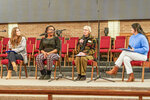




The Paluxy River Children’s Advocacy Center hosted an informational event to spread awareness regarding human trafficking and particularly child trafficking Jan. 18 at the Acton Methodist Church as part of human trafficking awareness month.
Trafficking is known as the illegal movement of children, typically for the purposes of forced labor or sexual exploitation for anything of value.
This event featured different speakers including Pete Wilkerson, child exploitation unit investigator with Hood County’s District Attorney’s Office; Ashton Martinez, director of education and engagement at the Paluxy River Children’s Advocacy Center (PRCAC); and Ashley Maxwell, a survivor of human trafficking. The event also featured a panel that included representatives from Unbound Now, including Paola Chavez Reyes and Rundee Smith as well as Cynthia Pigg, a community education specialist at the PRCAC.
“This is one of those issues that a lot of people ignore or pretend it doesn’t exist,” said Barry Robinson, pastor of Acton Methodist Church.
Wilkerson, who has been in law enforcement for over 40 years, works in the child exploitation unit where he investigates cases that deal with child sex crimes and child deaths across Hood County.
Wilkerson said the sad part is that the unit is extremely busy every day, not only with child sex abuse in the county, but also with child trafficking.
“Child trafficking in Hood County happens every day,” Wilkerson added. “Since the revamping of the trafficking statutes, I’ve filed two charges for child trafficking.”
Wilkerson shared the horrendous stories of child trafficking including girls aged 12, 14, and 15, all in Hood County. Each of the stories involved older men using young females for sexual abuse.
After these trafficking stories were told, the audience was able to learn more in depth about child trafficking from Martinez, including signs and tactics.
“It’s the second-fastest growing criminal activity,” Martinez said during the event. “There are approximately 79,000 victims in the State of Texas.”
Martinez said victims are typically targeted and followed for a period of time before “tricking them” into captivity. The perpetrator often forms relationships with the victim, making the victim feel more comfortable and open. She added that often these traffickers are “meeting the needs” of a victim who is vulnerable, such as providing a place to stay, money, a significant other and much more. Traffickers will then use manipulation tactics to make the victim too afraid to leave, such as making them feel guilty, unwanted, etc.
Martinez also shared the importance of online safety and being careful about choosing online friends. Often these traffickers their victims through social media.
“Ninety percent of the time these are not kidnapping situations,” Martinez said. “We need to change our mindset when we think of how these human trafficking situations happen. Online sex trafficking is increasingly becoming the norm.”
Martinez said it would be hard to recognize victims of trafficking in brief passings, but it is important to always pay attention to those around you who you are with often. Some signs someone is being trafficked can include major changes in mood or behavior, changes in physical appearance, not having a set living space, unexplained absences from typical outings, self-isolation, and much more. Martinez added some changes will be subtle and it is incredibly important to pay attention to those around you.
One thing that often leads to sex trafficking is “sextortion,” where someone is threatened or blackmailed to send sexual images, or they will share sexual images of the victim with the public. This can happen to anyone of any age but happens most often to youth.
“We see now that the number of extortions has almost doubled from 2021 to 2022 as far as reports,” Martinez shared. “Like traffickers, these extortioners are patient. This is also a money-making industry because they can sell their collected images.”
Martinez told the audience it is important to become aware of the capabilities of artificial intelligence when it comes to creating these fake images of someone that look real.
Martinez also shared that people often associate sextortion with females, but revealed it does happen to males, too.
“In 2022, 18 boys took their own lives because of sextortion in the United States, because they were fearful of what could happen,” Martinez told attendees.
She then shared some information from the National Center for Missing and Exploited Children (NCMEC).
“In 2022, its cyber tip line got over 32 million reports in the United States,” Martinez shared. “Of those, 49,000 were deemed urgent, meaning when they were investigated, they were immediately escalated to local law enforcement because those children were in immediate danger. That’s about 134 reports a day that needed immediate attention. Those were just the ones reported.”
Maxwell shared her personal story to raise awareness and let the attendees know that trafficking can happen right in one’s own family.
She shared firsthand her account of her adopted father abusing her adopted mother. At the age of 13, she found a hole in her bathroom wall where she discovered her father had been watching her while she was in the shower.
Her parents divorced, and when she was 15 years old, her mother “pimped her out to multiple men.” Her mother would put her in lingerie, drop her off, and tell Maxwell to “text her when she was finished” so she could pick her up.
She shared how her personality and the way she dressed drastically changed because her experiences.
“I was growing to become protective over my mom because after all, I should be so lucky to have a best friend,” Maxwell shared. “This is an example of what one part of grooming looks like in this critical time period of being a young adult. I was a walking shell of a human being because my life was not my own.”
Maxwell then shared that she became pregnant at the age of 15 and was reported to Child Protective Services (CPS) after neighbors were concerned of potential abuse. The CPS case was closed before Maxwell was ever offered the chance to speak. Maxwell noted her mother had pushed her to get pregnant since the age of 13 and told her that her “baby clock” was ticking, so her mom was thrilled when she became pregnant.
She was soon forced to marry a 24-year-old man her mother had found online; Maxwell was still just 15.
“Timing does matter. I survived long enough to age out of it,” Maxwell shared. “It is a privilege to age but what is not a privilege is to be exploited because of your age.”
Maxwell is now married with four children and lives in Granbury. She is set to obtain her real estate broker’s license in the spring and is set to become the youngest broker in Texas.
“If one action had been different by either a trusted adult or more questions would have been asked during that time in my life, my entire life could have been altered. It is our duty as a community to say something and do something if you suspect something is happening,” Maxwell said. “No version of help is small. When we do our part by listening and attending events like you are today, we can go out into our communities to make a difference.”
Next came an opportunity for the panelists to answer some questions regarding trafficking. Some of the advice given for protecting your child includes having an open relationship built on trust as well as monitoring their social media. The panelists recommended to be a good example for their children when it comes to online safety as well as becoming educated and staying up-to-date with the changing digital age.
The panelists shared how to “be there” for survivors of trafficking, including staying patient and present. They noted it is important not to push survivors, but to let them come to you and share what they are willing to.
The public can help prevent human trafficking by talking to local law enforcement and volunteering with local resources and centers, the panel said. As important as involvement by the public is education, and sharing knowledge with loved ones, the panel said.
For concerns of online exploitation and abuse call 1-800-843-5678 or use the online reporting tool at report.cybertip.org. To report suspected child abuse, call the Texas Child Abuse Hotline at 1-800-252-5900 and to report suspected human/sex trafficking call 1-888-373-7888. If a child is in immediate danger, call 911.
To contact the Hood County Child Exploitation Unit, contact Wilkerson at 682-279-4368, Katie Baron at 940-445-0104, or Dan Bradshaw at 682-279-4391.
“Education is power. This power should empower you. The way you make a difference is spotting those red flags and educating your realm of influence,” Martinez said during the event. “How bright does a candle shine in a dark room — bright. That’s what you can be to the dark world that we’re talking about.”